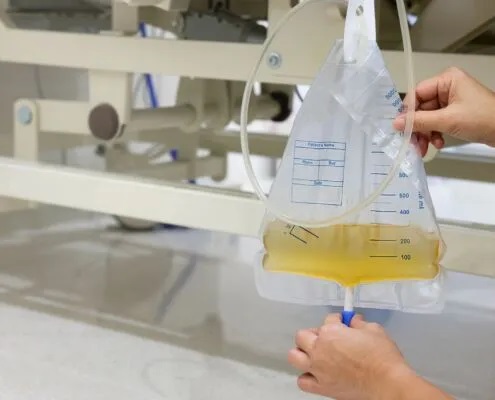

- Home
- Companies
- Remington Medical Inc.
- Articles
- Why Low-Cost Medical Drainage Bags ...
Why Low-Cost Medical Drainage Bags Could Actually Cost You More
At first glance, a cheaper drainage bag may seem like a smart move for a tight budget. But procurement teams know the real cost of a product goes far beyond the price on the invoice. When medical drainage bags fail to perform, the ripple effects show up in the form of surgical delays, patient dissatisfaction, and even infection risk. Discover the hidden costs of low-quality drainage bags and get the insights you need to make defensible, value-driven purchasing decisions.

For procurement teams under pressure to cut costs, the temptation to choose the lowest-price option can be strong. But when it comes to medical drainage bags, that short-term savings can come at the expense of long-term reliability and patient safety. The most common mistakes occur when unit price becomes the only metric evaluated, sidelining critical quality factors like durability, sterility, and regulatory compliance.
Another frequent misstep is trusting new or unknown suppliers who lack proper documentation or consistent track records. Drainage bags that appear similar on paper may vary drastically in performance, especially under surgical or high-output conditions.
When quality assurance is sacrificed for cost savings, it can lead to product failure, inconsistent inventory, and clinical complications that far outweigh any initial savings.
Hospitals don’t always feel the true impact of a poor-quality drainage product until it’s too late. Low-cost, low-performance medical drainage bags can generate both immediate and hidden expenses that affect multiple departments.
Direct costs include:
- Higher infection risk: Bags with compromised sterility or poor drainage control increase the chance of contamination or post-op complications.
- Increased replacement frequency: Inferior materials often lead to leaks, disconnections, or system failures that require frequent swaps.
- Staff time lost to troubleshooting: When drainage bags malfunction or aren’t user-friendly, nurses and techs spend more time replacing or adjusting them.
Indirect costs may include:
- Patient dissatisfaction or complaints: Leakage, discomfort, or odors from faulty drainage systems erode trust in care quality.
- Procedure delays: A failed drainage product can slow down surgeries or post-op transitions.
- Inventory waste: If staff avoid using certain products due to past issues, entire boxes can go unused and expire.
- Audit or accreditation risks: Inconsistent labeling or unclear sterility can put facilities out of compliance with regulatory requirements.
In other words, a low sticker price often signals a high total cost of ownership.
When procurement teams advocate for higher-quality medical drainage bags, they’re not just protecting the clinical environment, they’re making a case for smarter spending. Durable, compliant, and performance-tested solutions deliver cost savings in areas that aren’t always visible on a PO sheet but matter tremendously to your bottom line and accreditation standing.
Premium drainage bags are built for sterility, with clearly documented validations and packaging designed to maintain a secure barrier until point of use. This reduces contamination risk and supports infection control protocols, helping hospitals maintain Joint Commission or ISO compliance and avoid penalties linked to preventable infections.
Higher-grade bags feature design elements like anti-kink tubing, leak-resistant ports, and secure closures. These features help minimize the likelihood of mid-use failure, which cuts down on waste, staff interruptions, and the need to stockpile backup options. One quality bag per patient is far more efficient than using two or three low-cost ones to get through a single case.
Nurses and surgical techs notice when products work seamlessly—and when they don’t. Products that are easy to handle, connect properly, and perform reliably reduce stress and rework for clinical staff. Patients also benefit: fewer leaks, no unexpected bag failures, and better comfort mean fewer complaints and higher satisfaction scores.
Procurement teams are increasingly tasked with balancing cost, performance, and supply chain stability. Partnering with suppliers who can provide high-quality, FDA-registered medical drainage bags ensures consistent delivery, transparent documentation, and ongoing support. Over time, these relationships lead to fewer supply chain disruptions and more predictable budgeting.
The best way to avoid costly drainage product issues? Start with suppliers who prioritize sterility, reliability, and performance from day one. Browse Remington Medical’s full line of high-quality, FDA-registered medical devices today.
Not all suppliers of medical drainage bags hold themselves to the same standards. Before signing off on your next bulk order, make sure you’re asking the right questions—not just about price, but about product performance, traceability, and long-term reliability.
Here’s what your procurement team should clarify:
- Are your drainage bags FDA-registered and ISO 13485 certified?
- Do you provide sterilization validation and expiration labeling?
- What’s your typical lead time, and do you offer emergency fulfillment?
- Can you supply documentation on packaging integrity and puncture resistance?
- What support is available if product issues arise?
- How do you ensure consistent quality across manufacturing lots?
- Do you have a return policy or satisfaction guarantee?
Asking these questions helps you filter out risky vendors and ensure your facility gets reliable, compliant products that won’t compromise care or compliance.
How do you know when your choice of medical drainage bags is delivering the right results? Look for signs across your supply chain, clinical teams, and patient outcomes that confirm the value of your procurement decision.
When staff report fewer leaks, disconnects, or defective components, it’s a clear sign the product is doing its job. Reliable drainage bags reduce the need for replacements and rework during procedures.
Nurses and techs who work directly with drainage products will notice ease of use, packaging quality, and secure connections. When they prefer your chosen product, it supports smoother workflows and safer care delivery.
High-quality suppliers ensure consistent labeling, clear expiration dates, and good packaging practices. This helps reduce waste due to expired or questionable inventory, keeping your shelves ready for high-demand periods.
Strong sterility and labeling standards help reduce infection risk and protect your facility during audits or inspections. If your incident reporting rates stay low, your procurement strategy is doing its job.
At Remington Medical, we believe medical drainage bags should support clinical excellence, not just hit a price point. Our sterile, single-use drainage solutions are built for safety, reliability, and compliance—so your team can stay focused on delivering high-quality care.
Need help comparing options or navigating procurement criteria? Reach out to our team today to get guidance on choosing the right drainage products for your facility.
